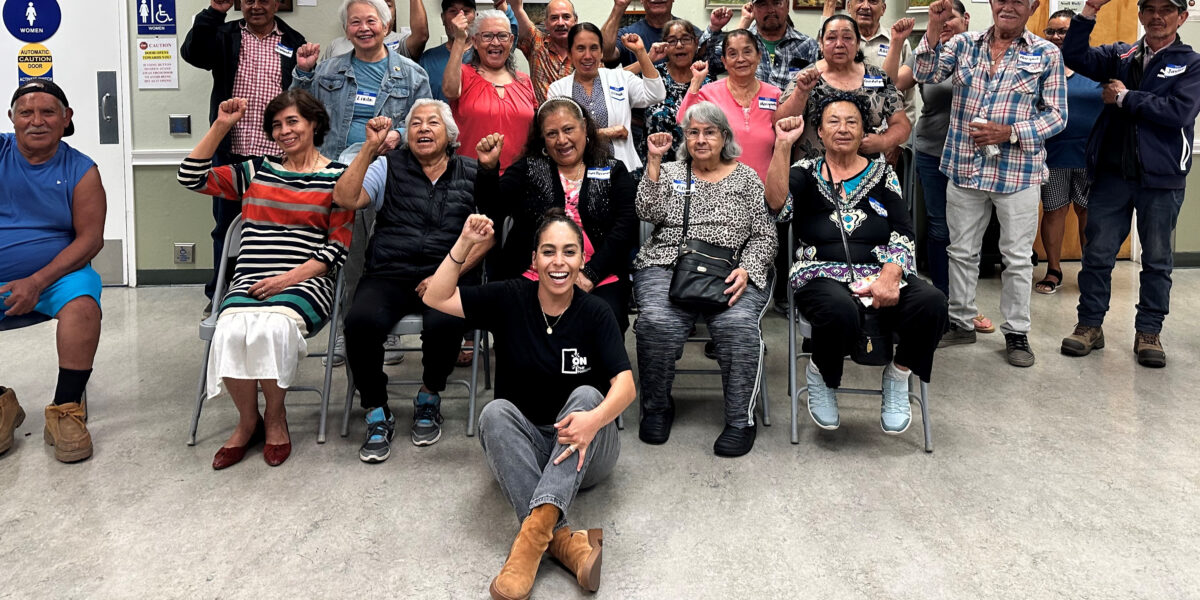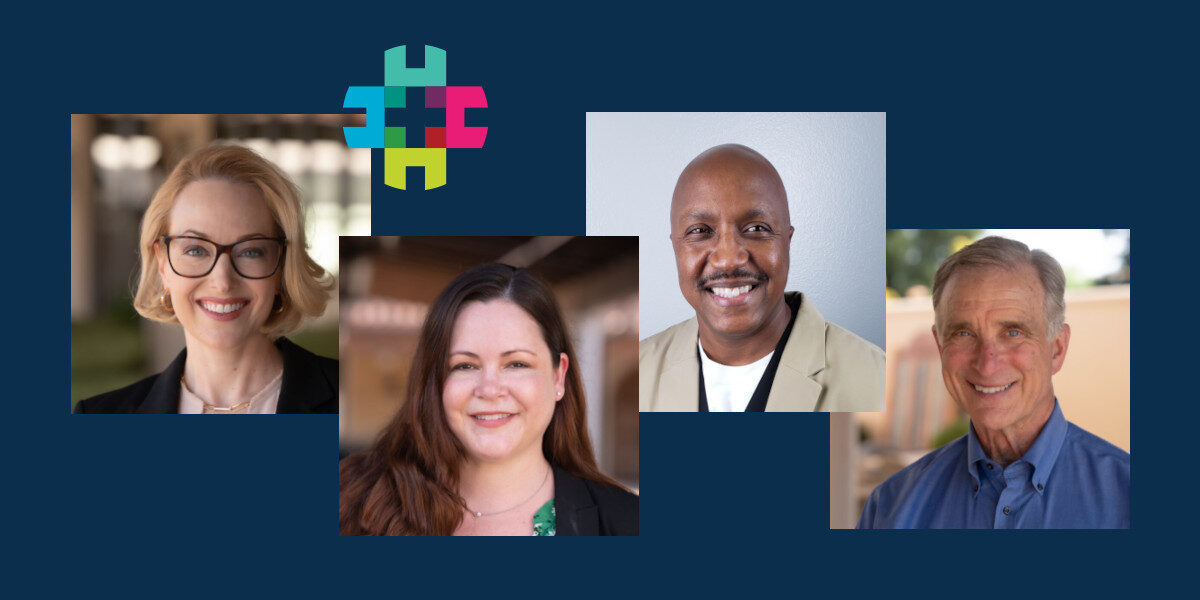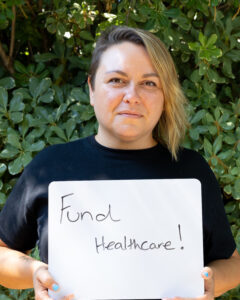

Spotlight on the Bicultural Clinical Training Program: Citlaly Martinez and Jennifer Oseguera Chavez
3.5 min read. To catch up on our two-year Bicultural Clinical Training Program, we spoke with Citlaly Martinez and Jennifer Oseguera Chavez, both trainees at Humanidad.
The Healthcare Foundation received funding from Kaiser Permanente in 2023 to launch a Bicultural Clinical Training Program, a two-pronged initiative in collaboration with Humanidad Therapy & Education Services and On the Margins that aims to increase access to quality bilingual and bicultural mental health services to Latine communities by strengthening the local pipeline of bilingual, bicultural mental health practitioners.
As part of that initiative, Santa Rosa–based Humanidad has extended its services to underserved residents of Cloverdale through two paid traineeships per year for two years. As a crucial aspect of this effort, the Humanidad traineeships offer graduate student trainees professional supervision by a bilingual, bicultural Clinical Supervisor—a rare opportunity designed to deepen the culturally responsive nature of the education and practice of the bilingual graduate student trainees.
The second year of the Humanidad traineeship includes Mental Health Talent Pipeline scholarship awardee Jennifer Oseguera Chavez as well as fellow USF third-year graduate student Citlaly Martinez, who has also worked at Humanidad since 2021. Both students are natives of Santa Rosa.
With their traineeships set to begin on August 1, we spoke with Citlaly and Jennifer about what draws them to Humanidad for their final “practicum” year in the USF graduate program and as future therapists serving residents of northern Sonoma County.
Graduate students normally have various options for where to spend their practicum year. What drew each of you to the traineeship at Humanidad?
Citlaly Martinez: I’ve been working at Humanidad for nearly three years now on the program side. What originally attracted me to Humanidad was that it was primarily Latino-based and with Latinos in leadership roles. It was the first organization I had encountered run primarily by people of color. Also, the population we serve — Indigenous communities and Spanish-speaking farm workers — is a population I identify with. To be able to give back to my community, now specifically as a clinician through the traineeship, was a major factor for me as I was looking into where to spend my practicum year. Another factor was the financial and supervisional support the traineeship offered. It is a cultural competency traineeship. I’m really looking forward to it.
“The barriers to accessing mental health services for many Latinos are multiple — including stigma around seeking help in the first place — so that by the time our clients finally succeed in getting to Humanidad it’s so important that they are accommodated and served to the best of our ability.”
Jennifer Oseguera Chavez
Jennifer Oseguera Chavez: Actually, Citlaly told me about Humanidad. I didn’t know much about it. After looking into it, I was also very drawn to Humanidad’s emphasis on multicultural competency as an agency run by people of color. The people who work there reflect the population they serve, which for me is really important. In my previous employment, I was one of the only people of color who spoke Spanish in my entire agency. That experience opened my eyes to the need for having more diverse and bilingual, bicultural staff who can support our community.
How significant is the bilingual/bicultural professional supervision offered as part of the traineeship?
Citlaly: In the therapy world generally there is a dominant Western perspective. That can be harmful in working with Latino clients whose cultural backgrounds include different beliefs or traditions, especially when it comes to healing practices. We’re going to have a supervisor who understands those beliefs without pathologizing them. That’s going to be really important. Even though I am Latina, I can’t speak for other Latino cultures. Being able to work under a clinician with long experience working across cultures will be helpful to me in supporting the clients I will work with.
Jenny: Those are very good points. It reminds me how important this aspect was for me when choosing Humanidad. I wanted to be part of the bilingual, bicultural team so that, whatever happens in working with my bilingual or monolingual Spanish-speaking clients, I can bring it into the supervision session using the client’s own language. I can relate their experiences without translating them into another language and trying to explain things that maybe don’t translate well. Because that sometimes happens. Translation into English can involve losing some of the impact and meaning. I wanted to have that support, and have a collaborative team that is also bilingual/bicultural, so in going back into the therapy room I am providing the best service to my client that I can.
The barriers to accessing mental health services for many Latinos are multiple, including stigma around seeking help in the first place. By the time our clients finally succeed in getting to Humanidad, it’s so important that they are accommodated and served to the best of our ability. If they want to speak in Spanish, let’s speak in Spanish. If they need a later appointment, let’s see what we can do to make that happen. That doesn’t necessarily happen in other agencies. That’s what I really value about Humanidad, because I strive to also be a bilingual, bicultural provider in northern Sonoma County who can serve the Latinx community and bridge those gaps and barriers that exist.
“Even though I am Latina, I can’t speak for other Latino cultures. Being able to work under a clinician with long experience working across cultures will be helpful to me in supporting the clients I will work with.”
Citlaly Martinez
Any final remarks you would like to make?
Citlaly: I appreciate that I’m part of a great cohort of graduate students at USF. We all are very supportive of one another. We’re a big cohort with many different perspectives. Everyone carries so much knowledge I feel like I grow with every single class we have. We’re not only learning from our professors, we’re also learning from each other.
Jenny: My journey with USF and partnership with the Healthcare Foundation has completely transformed my life. Not only in terms of personal and professional growth, but in terms of my awareness of the needs of my community, where the gaps exist in the mental health field. I, too, appreciate how much I learn from everyone in my cohort and from my professors. I’m learning how to be an amazing bilingual, bicultural therapist who can serve my community here in Sonoma County. People here deserve to have access to quality mental health services, in environments where they feel accepted, where they don’t feel judged, and where they can be themselves. I want to create a space where my clients have the liberty to process everything they may be carrying. There’s a lot of trauma in the community, and it’s rooted in experiences we might not understand without the cultural sensitivity or awareness that USF and organizations like Humanidad emphasize and make possible.
I’m really grateful for the Healthcare Foundation and USF for helping me get to this point where I am able to serve my community in this way. There are a lot of barriers for us first-gens, and we’re doing it! I’m proud of that, and thankful.

Related News + Stories
Invest in Our Community
Your support is vital to our collective vision of eliminating health inequities in northern Sonoma County.
Donate



